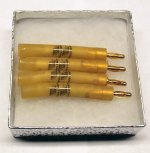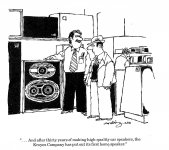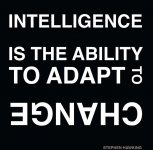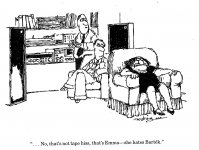It is also a prediction machine. If you spell A, P, P, L, 99.9 % of us will involuntarily think 'E'.
Same with perception, if you need say 10 parameters to form a visual or auditory picture, after the first 3 or 4 the brain already starts to call up memories from similar 'pictures' and starts to fill in the blanks.
The data will even be reversed: in the first example, there are signals going back to the primary auditory system to increase the gain for the 'E' sound.
Jan
Same with perception, if you need say 10 parameters to form a visual or auditory picture, after the first 3 or 4 the brain already starts to call up memories from similar 'pictures' and starts to fill in the blanks.
The data will even be reversed: in the first example, there are signals going back to the primary auditory system to increase the gain for the 'E' sound.
Jan
For 8.999.00 $ Entreq Tellus earth is from Apollo mission 😉
Mono and Stereo High-End Audio Magazine: Interesting ground box project
For THAT amount of $, you better have craftmanship done right. (even if it´s BS ) But this looks more like children labour in poor countries

Exactly.
The brain is effectively a massive correlator, always trying to extract signal from noise. If you listen to noise long enough, you will hear voices - as that is what the brain is trying to do. There are many many records of this from radio operators over the years.
The slightly more interesting aspect is that you can be taught, or learn through practice, to hear this error more frequently. This is the danger in teaching people to hear differences - you can be taught to hear what is not there.
I believe some of it may come from the desire to hear something,
and/or Your mind wanting to make order out of chaos.
It does take a bit of practice to pick out a signal in the noise.
I would also tend to believe that it also takes practice to train
your mind Not to put order to the chaos (not to make up a signal).
I've been listing to SW and Amateur radio for about
45 years so I've had some time to work on that skill.
John, some kind of field effect.
I first discovered this long time ago when I used a house brick on top of my cdp to dampen acoustic feedback/vibration.
One day I picked up the brick so I could remove the lid and do some internal tweaking but changed my mind and replaced the brick, except rotated 180*.
The system sound changed...what the ?.
I flipped the brick back and forth and confirmed that the effect of the brick is directional.
This observation has led to long process of experimentation culminating in my filters.
My summary is that biologically beneficial elements and compounds sound pleasing, and biologically toxic elements sound, well toxic.
Squabble away folks.
Dan.
But did you try it at 90 degrees?
We can see Tobydogs in cloud formations, does that mean they're really there.
😕
For THAT amount of $, you better have craftmanship done right.
(even if it´s BS )
Looks like wood work is made locally in his garage.
With quantum stickers on it is incarnate perfection.
Cable silencers that some other " alien " technology
Audio Magic Cable Silencers
Interesting product description and bargain offer
Thanks to HarryY for link sharing 😀
Attachments
Exactly.
The brain is effectively a massive correlator, always trying to extract signal from noise. If you listen to noise long enough, you will hear voices - as that is what the brain is trying to do. There are many many records of this from radio operators over the years.
The slightly more interesting aspect is that you can be taught, or learn through practice, to hear this error more frequently. This is the danger in teaching people to hear differences - you can be taught to hear what is not there.
Hearing voices in noise is very different from hearing cross-over distortion in music. In Schizophrenia, for example, an imbalance in neurotransmitters is associated with hearing voices in noise. In some cases, wearing earplugs can help reduce the voices, as they reduce the excitation due to noise. Hearing voices is not limited to schizophrenia however, hearing voices can occur due to sleep deprivation or other circumstances and conditions. It just happens to be one of the first things to go awry when brains start to malfunction in certain ways. Something has to go first and hearing voices can occur fairly easily, that's all.
That being said, hearing cross-over distortion in music is not something known to occur in the same way that humans are inclined to hear voices. Learning how to hear distortion is not associated with any increased risk of hearing voices. It is likely to be associated with less enjoyment of recorded music though. Trained listeners can become very picky, and it can take a long time for that pickiness to gradually diminish. That could be a good reason to avoid training to hear some kinds of things.
For a somewhat related example, some people with perfect pitch find it difficult to enjoy music not perfectly tuned to A=440Hz. For musicians though, ear training to better discern pitch can be useful. Similarly, for recording and mastering engineers, learning to hear small mistakes in recordings can be useful, but it might be more of an annoyance for people who don't need to hear such things.
EDIT: In addition, false positives and false negatives can occur with more than just hearing. Also, consequences of such problems can be compounded when over-confidence bias is particularly active.
Last edited:
There a long history of people being silent and/or isolating themselves, then after time they start to hear voices.....I believe some of it may come from the desire to hear something,
and/or Your mind wanting to make order out of chaos.
That's exactly my point.How can one not trust one's own ears ?.
You were born with them and have used them all your life....you ought to understand them by now, surely ?.
Dan.
I've known for a long time what my ears are capable of. I am fortunate to have a very good sense of pitch, for example. This helps me not just with obvious tasks like determining the key of a piece of music, but also with things like locating resonant peaks in frequency response by ear. (This was useful for live sound mixing back in the days before "feedback finders," heh.)
It's only been in more recent years that I've begun to understand and accept how infallible my ears aren't, and how easily even my "good" ears (not to mention all the other senses) can be tricked. And yes, it is a humbling experience.
But it is exactly this later revelation that has taken my own quest for good sound to the level it's at now. It's taught me, when evaluating my various audio systems, to eliminate as many subjective choices as possible / practical, and learn as much as I can about more objective research such as accurate measurements, etc. Sure, it's a lot more time-consuming, but it can also be interesting and fun.
Using this approach, I've managed to leave my long-held plateau of having a "damn good stereo," and have now climbed a lot closer to the peak experience of having famous musicians hanging out in my living room.
And I feel like I must be doing something right because for the most part, I've stopped dicking around with my audio system! I no longer feel that familiar, nagging compulsion to chase after some tweak or another, because I've mostly run out of things to fix! I can just boot it up, put on some music, and instead of going down the old to-do list as I listen, I can just sit back, relax, and say, holy crap that's scary good.
Anyway - more recently I've condensed the above screed down to: "The less I trust my ears, the better my music sounds." So that's what that's about. 🙄
Last edited:
I would also tend to believe that it also takes practice to train
your mind Not to put order to the chaos (not to make up a signal).
Agreed. People have some ability to learn how to reduce false-positive errors.
O
A retired logger neighbour dropped by, to visit, and asked what all the holes were for.
Within twenty minutes, he found some branch he liked, and dowsed a well location.
So some guy who had lived in the area all his life and lived 'in the woods' for a lot of that understood the local water table*...No sh*t sherlock.
* finding an aquifer or underground stream would be more impressive then something that is all around under ones feet, albeit at varying depths.
Why dowsing makes perfect sense | New Scientist some light reading giving one viewpoint of the headology behind it all.
Directional bricks!! and i really thought i'd seen it all when it came to obsessive system tweaking .....
Hearing voices in noise is very different from hearing cross-over distortion in music..
Poor choice as Earl has show in tests that cross-over distortion is very easily detected.
Poor choice as Earl has show in tests that cross-over distortion is very easily detected.
Easily detected at 0.1%, yes. Seems to me if at a sufficiently low level, some training and careful listening probably can aid detection.
What does "at 0.1%" even mean though? The only way I know of to get a number for distortion like that is with a sinewave, not with music. Otherwise. 0.1% of what? The amplitude of music components changes constantly.
Last edited:
This would be the dowsers that Randi offered huge amounts of money to if they could prove their skills..and they couldn't?
One Million Dollar Paranormal Challenge - Wikipedia
Yep, Randi's organization tested dozens of dowsers over the past decades and NONE of them could reliably demo their talents.
These were 'experienced' dowsers as you needed a history and 'cred' to apply for the Randi challenge. The dowser and R org would set up a procedure, agreed upon by BOTH in advance, about what counted as a clear hit and miss.
They would run an open initial test and the dowsers always performed to spec but as soon as it subsequently went double blind they lost ALL of their previous abilities.
the brain "filling in":

Attachments
I've always liked "There are 10 types of people in the world,, those who know binary and those who don't."
Hearing voices in noise is very different from hearing cross-over distortion in music. In Schizophrenia, for example, an imbalance in neurotransmitters is associated with hearing voices in noise. In some cases, wearing earplugs can help reduce the voices, as they reduce the excitation due to noise. Hearing voices is not limited to schizophrenia however, hearing voices can occur due to sleep deprivation or other circumstances and conditions. It just happens to be one of the first things to go awry when brains start to malfunction in certain ways. Something has to go first and hearing voices can occur fairly easily, that's all.
That being said, hearing cross-over distortion in music is not something known to occur in the same way that humans are inclined to hear voices. Learning how to hear distortion is not associated with any increased risk of hearing voices. It is likely to be associated with less enjoyment of recorded music though. Trained listeners can become very picky, and it can take a long time for that pickiness to gradually diminish. That could be a good reason to avoid training to hear some kinds of things.
For a somewhat related example, some people with perfect pitch find it difficult to enjoy music not perfectly tuned to A=440Hz. For musicians though, ear training to better discern pitch can be useful. Similarly, for recording and mastering engineers, learning to hear small mistakes in recordings can be useful, but it might be more of an annoyance for people who don't need to hear such things.
EDIT: In addition, false positives and false negatives can occur with more than just hearing. Also, consequences of such problems can be compounded when over-confidence bias is particularly active.
Wow, very interesting. I have good pitch sensitivity but am NOT pitch perfect. I wouldn't know if a given song is in the correct pitch, but I WILL know if the performers aren't playing in correct relation to the pitch being played. In other words, I have good interval sensitivity but am not pitch perfect. I hear pretty slight off-center LP pressings, which is a pain but at least I don't go crazy if the LP or the turntable is off-pitch.
The reason I find this interesting is that it reinforces the notion (that I mentioned earlier) that different people have different relationships to sound. I wouldn't ever tell someone they don't hear something, at least until there is a blind or double blind study to prove their hearing. Even then... Remember that it's possible to prove a positive (that they CAN hear something) but not a negative (that they CAN'T hear something).
- Status
- Not open for further replies.
- Home
- Member Areas
- The Lounge
- Funniest snake oil theories





